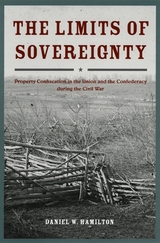
Americans take for granted that government does not have the right to permanently seize private property without just compensation. Yet for much of American history, such a view constituted the weaker side of an ongoing argument about government sovereignty and individual rights. What brought about this drastic shift in legal and political thought?
Daniel W. Hamilton locates that change in the crucible of the Civil War. In the early days of the war, Congress passed the First and Second Confiscation Acts, authorizing the Union to seize private property in the rebellious states of the Confederacy, and the Confederate Congress responded with the broader Sequestration Act. The competing acts fueled a fierce, sustained debate among legislators and lawyers about the principles underlying alternative ideas of private property and state power, a debate which by 1870 was increasingly dominated by today’s view of more limited government power.
Through its exploration of this little-studied consequence of the debates over confiscation during the Civil War, The Limits of Sovereignty will be essential to an understanding of the place of private property in American law and legal history.

During his career at Harvard, Morton Horwitz changed the questions legal historians ask. The Transformation of American Law, 1780–1860 (1977) disclosed the many ways that judge-made law favored commercial and property interests and remade law to promote economic growth. The Transformation of American Law, 1870–1960 (1992) continued that project, with a focus on ideas that reshaped law as we struggled for objective and neutral legal responses to our country’s crises.
In this book, Horwitz’s students re-examine legal history from America’s colonial era to the late twentieth century. They ask classic Horwitzian questions, of how legal doctrine, thought, and practice are shaped by the interests of the powerful, as well as by the ideas of lawyers, politicians, and others. The essays address current questions in legal history, from colonial legal practice to questions of empire, civil rights, and constitutionalism in a democracy. The essays are, like Horwitz, provocative and original as they continue his transformation of American legal history.

Over the course of his career at Harvard, Morton Horwitz changed the questions legal historians ask. The Transformation of American Law, 1780–1860 (1977) disclosed the many ways that judge-made law favored commercial and property interests and remade law to promote economic growth. The Transformation of American Law, 1870–1960 (1992) continued that project, with a focus on ideas that reshaped law as we struggled for objective and neutral legal responses to our country’s crises. In more recent years he has written extensively on the legal realists and the Warren Court.
Following an earlier festschrift volume by his former students, this volume includes essays by Horwitz’s colleagues at Harvard and those from across the academy, as well as his students. These essays assess specific themes in Horwitz’s work, from the antebellum era to the Warren Court, from jurisprudence to the influence of economics on judicial doctrine. The essays are, like Horwitz, provocative and original as they continue his transformation of American legal history.
READERS
Browse our collection.
PUBLISHERS
See BiblioVault's publisher services.
STUDENT SERVICES
Files for college accessibility offices.
UChicago Accessibility Resources
home | accessibility | search | about | contact us
BiblioVault ® 2001 - 2024
The University of Chicago Press









